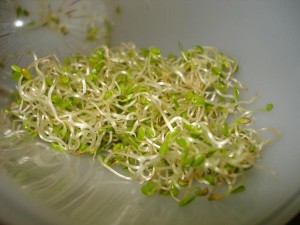On July 1, 2011, Evergreen Fresh Sprouts announced a voluntary recall of Alfalfa Sprouts and Spicy Sprouts because they had the potential to be contaminated with salmonella.
Owner Nadine Scharf said three days earlier, “The FDA encouraged us to do a recall but I said I needed to see hard evidence that our sprouts were involved … We’ve never had any problem before. We do the same thing that we’ve done for 24 years.”
Yet as of June 27, 2011, 21 individuals, including three hospitalizations, infected with  outbreak strain of Salmonella Enteritidis had been linked to the sprouts.
outbreak strain of Salmonella Enteritidis had been linked to the sprouts.
So Evergreen relented and issued a voluntary recall.
Last week, owner Nadine Scharf told the Spokesman Review she’s regretted that decision ever since.
“It went on the Internet that we had bacteria in our plant,” Scharf said. “They said: ‘Don’t eat their sprouts. If you have them in your fridge, get rid of them. Don’t even give them to your animals.’ ”
More than a month later, the test results showed no bacteria was found at Evergreen Produce, in Moyie Springs.
The FDA, however, didn’t relent on its conclusion that the business was the origin of the outbreak.
It’s a case that underscores a difficult regulatory balance: Move quickly on the best information available to extinguish a dangerous public health threat, or conduct a more meticulous investigation to protect a business from potential harm?
A year later, Scharf and her family are still trying piece back together the business they grew from the ground up.
The sprout-growing business started in the Scharf family almost 25 years ago as something for Fred and Nadine Scharf to do with their two home-schooled sons.
They kept vats in their house and sold the sprouts in small amounts to neighbors and local grocery stores.
One of the business’s biggest clients was Fairchild Air Force Base, which routinely sent military inspectors to the warehouse before the food could come on base.
That’s why the Scharfs were so surprised when, a month after their last military inspection, the FDA came knocking.
The FDA did not respond to numerous requests for an interview for this story.
Previously, however, an FDA representative said negative test results did not necessarily rule out Evergreen sprouts as the cause of the outbreak. Pathogens may have been contaminating only one portion of the food, the representative said.
What’s more, once the FDA ordered the voluntary recall, no more salmonella cases were reported.
Months later, Scharf began healing the reputation of her business. She convinced her clients the business was clean. She personally contacted each buyer. She hid nothing, sending them the test results.
Last winter – after almost four months of no business – orders starting coming in again.
Scharf’s sons, who have families and careers of their own now, came back to help restart the business. David and his wife, Jolene, now run Evergreen Produce full time. Nadine and Fred retired two months ago.
Their grandkids are on the list of 12 people now employed. Business is about 75 percent of what it was before the recall.
The family said they have contacted the FDA to ask if they will ever be officially vindicated.
“I said, ‘You have ruined our business. … Are you going to help us get back online now?’ ” Nadine Scharf said. “They said: ‘We have never done that and we never will.’ ”
A table of sprout-related outbreaks can be found at http://bites.ksu.edu/sprouts-associated-outbreaks.
 • A total of 19 persons infected with the outbreak strain of Shiga toxin-producing Escherichia coli O121 (STEC O121) were reported from six states.
• A total of 19 persons infected with the outbreak strain of Shiga toxin-producing Escherichia coli O121 (STEC O121) were reported from six states.

